- Home
- J. T. Edson
The Texan
The Texan Read online
JT
EDSON
THE
TEXAN
When the gunplay started the five Texans were in there, fighting to a man. And when the gunsmoke cleared, they were the ones still on their feet. If you were lucky enough to be their friend you were a friend for life. If, though, you made yourself their enemy, you might as well start digging your own grave. Because if you called down one of them, you called down all five. That was the way things were with the legendary Floating Outfit.
“SHED THAT BELT,” the Texan told Benjy.
“Boy, you’re letting that badge go to your head. I know you ain’t Dusty Fog.”
“Get it off!” It was not a polite request now but an order.
Benjy Vent sent his right hand down towards his gun butt, and behind the bar, Smith started to bring his shotgun out.
The Texan’s hands crossed in a flickering sight-defying blur of movement. The barlights caught and threw back a dull flicker from the blued barrels of the matched guns as they came out, flame tearing from the muzzles. Benjy Vent rocked back on to his heels as lead smashed into his shoulder. He hit the bar and went down, screaming in pain, his gun falling from his hand. At the same instant, Smith was hurled back into the wall, bringing some bottles down from the shelf. For an instant he stood erect, but the hole between his eyes showed that it was only the muscular reaction of a dead man.
THE TEXAN
A CORGI BOOK 0 552 07844 1
Originally published in Great Britain
by Brown Watson Ltd.
PRINTING HISTORY
Corgi Edition published 1968
Reprinted 1968, reissued 1971
Corgi Edition reprinted 1974
Corgi Edition reprinted 1979
Copyright © 1962 by Brown Watson Ltd.
Copyright © 1968 by Transworld Publishers Ltd.
This book is set in 9pt. Times.
Corgi Books are published by Transworld Publishers Ltd.,
Century House,
61-63 Uxbridge Road, Ealing, London, W5 5SA.
Made and printed in Great Britain by
Cox & Wyman Ltd., London, Reading and Fakenham
CHAPTER ONE
A Case Of Mistaken Identity
“Give me back that scalp!”
The words, yelled in a schoolboy’s treble, came to Marshal Jack Mollison as he walked the Main Street of Tensonville, New Mexico. For a moment he stood listening to the yelling and scuffling, then walked in between two houses to investigate.
The two fighting boys separated as they saw the lean, angular form of the Marshal bearing down on them. Mollison was a respected and well-liked lawman in this town. True, he did not present the eye-catching appearance of either Wyatt Earp nor the late, but not overly-lamented Wild Bill Hickok. Not for him the expensively-tailored clothes, the shiny town shoes, or the easily-greased palm. No one ever presented him with a long-barrelled gun as either a token of respect, or in the Texas view, payment for services rendered. Rather he looked like the foreman of a ranch with his range clothes, and, even after several years of Peacemaker production, he still clung to his old Colt 1860 Army revolver.
For a moment, Mollison thought the object one of the boys held was a scalp. It came as a relief to see it was only a well-made wig of red hair.
“I found it. That makes it mine, don’t it, Mr. Mollison?” one of the pair asked.
“Waal, now, happen you find an unrecorded gold strike, or a steer without a brand, it’s yours. But if you find something like money, or that thing, it isn’t. That’s the law—don’t ask me why, but that’s it.”
The boy reluctantly handed over the wig. “I allus wanted a real scalp. Wonder who it belongs to?”
Mollison was wondering just the same thing. To the best of his knowledge, no man in town wore a wig of any kind; and there were not many red-headed men in this section. He turned the wig over in his hands; but on the inside there was nothing to help identify its owner.
“Where’d you find it?” he asked.
“Out back of the Vent Bar,” the boy replied, still eyeing the wig wistfully. “Can’t I have it?”
“Law says I have to hold it for a spell, to give the owner a chance to come in and claim it. So I’ll just have to hold on to it down at the jail. But any reward I get for it I’ll give you.” Mollison watched the disappointed face and dug out a quarter to pass it across to the youngster. “Here’s something on account.”
This satisfied the two youngsters. They walked away together, their fight forgotten. Mollison watched them go, then looked at the wig again, and went along to his office. Inside the small room, he went to the safe, opened it and threw the wig inside. Locking the door he went back to his desk and took out a sheaf of reports sent out by the Texas Rangers. These reports covered the activities of various outlaw gangs. The one he wanted was on top.
“The Shotgun Gang,” it read. “No known members. Number of gang usually four or five. No adequate descriptions of any members. One is small with red hair. Others are all tall.”
The report went on to list the various stage hold-ups this gang was responsible for; and the fact that, although they wore hand-guns, their main line of defence were the ten-gauge shotguns they always carried.
Standing up, Mollison walked across the room and out into the street. He stood there for a moment, looking first up towards Pop Howard’s livery barn, then in the opposite direction at the post office. Finally, his eyes took in the front of the Vent Bar, Tensonville’s only saloon. The paint of the name was still new-looking, compared with the other buildings. This was because Barry Vent was not long in this town, having won the business in a poker game from its previous owner six months back.
The Marshal loosed his old gun in the holster and stepped forward out across the street. He went on to the opposite sidewalk and stepped along until he could see into the bar. It was dimly-lit and there were only five men inside. He pushed open the batwing doors and looked the five over. Four were the saloon’s hired hands; the fifth, a handsome, dandy-dressed young man belting a brace of silver-mounted Colts, was Benjy Vent, brother of the owner.
It was the four men who interested Mollison—for he knew Benjy Vent to be a swaggering bully, trouble-causer and coward, who would have been cut down long since, without the backing of his brother’s toughs.
Two of the four were tall and thin, the other two short and stocky. The tall pair were Brandon, a gangling beanpole who wore range clothes and served behind the bar, and Wheeler, a town-dressed Missourian who acted as a waiter. The short couple were a bald hardcase called Shorty Smith and a red-haired, flashily-dressed dude waiter known as Haines. These four, along with a killer called Slingo Witch, were Barry Vent’s entire staff, a clannish bunch who got on with themselves and made no attempt to become friendly with anyone in town.
“Howdy, Marshal,” Smith said as he polished the bartop with a cloth. “We don’t see much of you in here.”
“Don’t often see you four all in here at one time, either,” Mollison answered—thinking that, when Barry Vent or Slingo Witch were absent, it was always Smith who did the talking.
“Trade’s never enough for us all four, ‘cepting on payday.”
“Funny thing that, last pay-night there wasn’t but the two of you in here,” Mollison remarked.
“Yes, there was,” Smith was just a shade too quick off the mark. “We worked in two shifts—right boys?”
“What’re you getting at Marshal?” Vent asked.
“Nothing much—except that, mebbe, you’ve been too long in this town. Happen you stop. I might start thinking things.”
“What sort of things?”
“Like how, if you put a wig on Smith and dressed him up, he’d be mistook for Haines—especially if he was around the tables,
instead of behind the bar.”
“What’re you accusing us of?” Benjy Vent snarled.
“Nothing, just asking. One thing though, sonny. Keep away from my daughter—she doesn’t want any part of you.”
“Yeah?” Benjy sneered and moved forward, his hands hovering near the butts of his guns. “Who says so?”
Mollison back-handed the young man hard, spinning him into the bar. Then he followed it up with a right to his stomach, which doubled Benjy over. The youngster went to his knees, holding his stomach and moaning, not offering to either get up or fight back. Smith looked over and snarled deep in his throat angrily. Mollison came round and snapped:
“What’d you say?”
“Barry Vent ain’t going to like this, Mollison. He’ll be wanting to see you.”
“Tell him I’ll be waiting by that cottonwood just outside town. And tell him to come himself, not to send his hired killer.”
“I’ll tell him, Mollison, I’ll tell him,” Smith answered. “He’ll likely be along to see you.”
After the Marshal left, Smith came round the bar and dragged Benjy to his feet. With anger and contempt curling his lips, the small man snarled, “I’m quick getting sick of you and your mouth. Barry’s told you to keep your fool trap shut and let me do all the talking when the law comes round.”
Barry Vent and his men lived in a small house next door to the saloon. It was owned by a widow who worked at the eating-house and was never at home during the day. Smith and Benjy entered and went upstairs to the room Barry Vent used for himself and his constant companion—the killer, Slingo Witch.
Barry Vent looked up from the letter he was reading when Smith and his brother entered. He noted Benjy’s dishevelled clothes and asked, “What happened?”
Smith looked the two men over. Vent was tall, handsome and dressed in the height of frontier gambling fashion. Even in the house, he wore a glove on his right hand; Smith had never seen him without a glove on. Slingo Witch was also tall, lean and his face was hard, cold and emotionless. He wore range clothes, dark in colour and untidy, only the gun-belt with the matched guns was cared for in his appearance.
“Mollison came into the saloon and got to asking questions. Then Benjy here started sassing him. I reckon the Marshal’s getting suspicious,” Smith replied.
Barry Vent looked hard at his brother and then back at Smith. Benjy scowled defiance back, but was nervous. He knew that Slingo Witch would kill him if he gave him half a chance out. He jerked a thumb towards Smith and snapped:
‘This bard man didn’t help me. Him and the rest just stood by while Mollison hit me.’
‘He didn’t hit you hard enough,’ Barry barked back. ‘I’ve warned you about getting flip with Mollison and to stay clear of his girl. He’s not the sort of man to stand for any big-mouth talk from you. The girl doesn’t want you and the blacksmith is keen on her. You keep fooling round and we’ll get bad trouble.”
“We’ve got it now,” Smith put in. “Mollison got to saying how me and Bud Haines looked alike. Then this loud mouth here had to ask him what he was accusing us of.”
“The Marshal’s getting all suspicious, is he?” Slingo Witch asked, his voice a soft purr, his hands as always near to his gun-butts.
“Yeah, allows we’ve been round here too long. Say’s he’ll be waiting to see you under that cottonwood there, and for you to come alone, Barry.” Smith watched Barry Vent’s face all the time, remembering he’d never seen the gambler either use or hold a gun.
“Sure’d hate to see a man disappointed, Barry,” Slingo Witch’s voice showed no feeling. He rose with a little move and went to the window, looking out.
Across the street, and through a gap in between the opposite houses, Witch could see the cottonwood tree, and, under it, the tall shape of the Marshal. Barry Vent came to stand by the other man’s side, looking down also. He turned and came back to face his brother and Smith.
“Listen, and listen good, you two. I’ve heard from our friend with Wells Fargo. There’s a shipment on a stage through here in the near future. We’re going to take it when he sends us the telegraph message. Until then, I don’t want any trouble at all. I’m going to settle Mollison right now. Smith, you take Benjy to the saloon and keep him there.”
Smith nodded. He walked to the door and jerked his head to Benjy, who followed him out of the room. Slingo Witch watched them go, then went to the closet and opened the door to take something out, saying: “You go ahead and see the Marshal.”
Jack Mollison watched the gambler walking towards him. His challenge was getting better results than he’d hoped for. It was only on the off-chance that he had given out the challenge, for he had not thought that Barry Vent would come out here and face him down. His suspicions were correct; Barry Vent did have something to hide. It was something which kept him running a small saloon in this out-of-the-way town, making a small profit when he could have been in some far larger and more affluent location.
Vent halted, standing with legs apart, hand hovering over the butt of his fancy pearl-handled Remington revolver. He looked around. There was no one near; down at the livery barn, Mollison’s father-in-law, Pop Howard, was working in the corral, but was not looking this way.
“I hear you’ve been asking my boys some questions,” Vent said.
“Sure—and, from the way they acted, I reckon it’s time you moved on.”
“Meaning?”
“From now on, I’m going to keep a real careful watch on your place, and make sure who’s there. That way, I don’t reckon the Shotgun Gang will ride again.”
Silence fell, neither man saying a word as they watched each other. At last, Barry Vent spoke: “You know too much!”
Mollison’s hand went down as Barry Vent’s moved, the old 1860 Army gun coming clear of leather.
Along the street Pop Howard heard the shot, and turned. He stared, gave an angry, startled curse and, with a speed which belied his years and his bowed legs, climbed the corral fence and hurried towards the tree.
The Marshal lay on his back under the tree. In his hand his old gun was smoking. Barry Vent stood looking down at him, gun in leather. He shook his head as a crowd started to gather.
“Mollison drew on me. I had to kill him.”
By that time, Slingo Witch and Smith were forcing their way through the crowd and flanking their boss. They faced the crowd, watching the tall, muscular young blacksmith and the middle-sized, bandy-legged old-timer, Pop Howard. These were the two men most likely to cause trouble. Johnny Sinclair never wore a gun, but his big hands were weapon enough. Pop Howard was not wearing his old Dragoon Colt, but he was a ringy cuss and capable of making war.
“Never knowed Jack pull first on any man,” Howard growled.
“Calling the boss a liar, old man?” Slingo Witch asked.
A thin, emaciated old-timer wearing a threadbare suit and a dirty, collarless white shirt moved forward. “Pop didn’t mean it that ways, Mr. Witch, Ain’t none of us doubting Mr. Vent’s words.”
“Mollison’s gun’s out and smoking,” Vent pointed out.
“Why’d he draw?” Johnny Sinclair asked.
“You know these old John laws,” Slingo Witch answered. “They have to stack up—”
The words ended up abruptly as Johnny Sinclair lunged forward, a big fist shooting out. The killer went over backwards, smashing to the ground with both legs waving. The blacksmith started to move forward, but Pop Howard caught his arm, holding him back. The old-timer knew that Witch was out of the game; but Smith would take a hand in it, if Johnny Sinclair attacked the killer again.
“Cut it out, Johnny!” he snapped. “Go see to Jean—she’ll need caring for. Two of you gent’s help me to get Jack home.”
Johnny Sinclair turned and walked away. Two of the men lifted the still form and followed Pop Howard towards the livery barn. Barry Vent watched them go, then turned to the crowd, looking round.
“Jack Mollison sent for me to come here and see him
. When I came, he went for his gun. I didn’t have a choice but to kill him.”
* * *
The cowhand rode into Tensonville a week after the shooting. He halted the seventeen-hand paint stallion for a moment, looking along the main street, then at the bullet-pocked board which announced to all and sundry that this was the town of Tensonville, Curry County, New Mexico. For some reason, this sign made him smile; he looked like a man who was surprised to find the town at all. Kneeing the big horse gently, he allowed it to move forward, headed for Howard’s livery barn.
The horse was a beauty, even with the rangeland prejudice against paints for working mounts. It was seventeen hands of uncut, thoroughbred wickedness, from its head to the long tail; not the sort of horse a beginner would chose to learn riding on—not if he wanted to live long enough to learn. It was a fine-looking horse, one which had cost plenty; somehow, the rider did not give the impression that he should own, or be riding, such a fine animal.
He was a smallish man, not more than five-foot-six; yet to anyone who looked, he was wide-shouldered and strong-looking. His low-crowned, wide-brimmed black Stetson was expensive and set back on his dusty blond-coloured hair. His face was handsome and young-looking, yet it was not a weak face. His bandana, shirt and levis were not new, being faded and well-washed; but his boots were costly, fancy-stitched, and the Kelly spurs on them were of top quality. Around his waist was a gun-belt and, in the holsters, butt forward, were a brace of white-handled, matched Colt Civilian Peacemakers.
He lounged easily in the saddle; it was a good Texas rig, low-horned and double-girthed. Behind the cantle was strapped his bedroll; to the horn, a sixty foot rope; and, from under his left leg, in its saddle-boot was a Winchester Model 73 carbine.
Johnny Sinclair and Jean Mollison were talking at the door of the livery stable when the cowhand rode leisurely towards the corral. Neither took much notice of him at first; he was not the sort who would catch the eye. Besides, they were in earnest and urgent conversation on a matter of some importance.

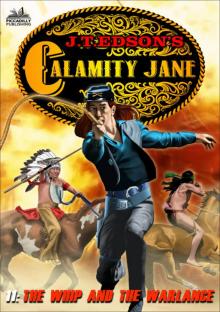 Calamity Jane 11
Calamity Jane 11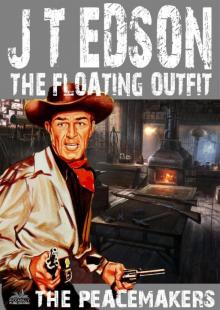 The Floating Outift 33
The Floating Outift 33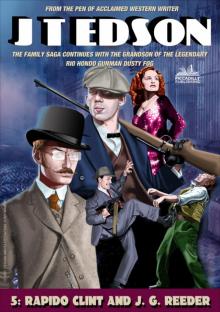 Cap Fog 5
Cap Fog 5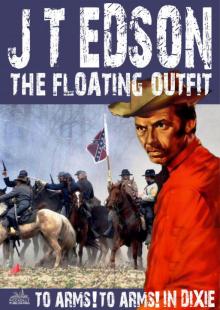 The Floating Outfit 34
The Floating Outfit 34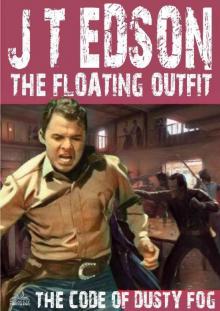 The Code of Dusty Fog
The Code of Dusty Fog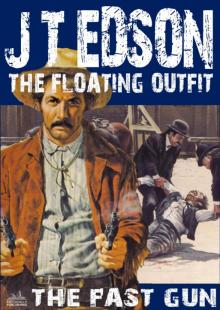 The Floating Outfit 21
The Floating Outfit 21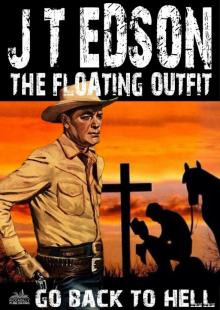 The Floating Outift 36
The Floating Outift 36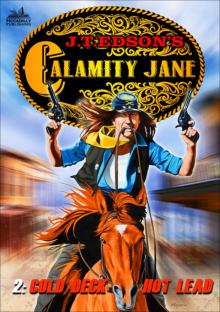 Calamity Jane 2
Calamity Jane 2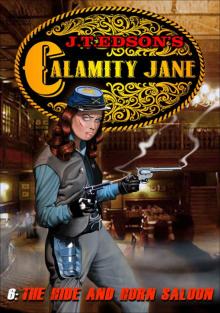 Calamity Jane 6: The Hide and Horn Saloon (A Calamity Jane Western)
Calamity Jane 6: The Hide and Horn Saloon (A Calamity Jane Western)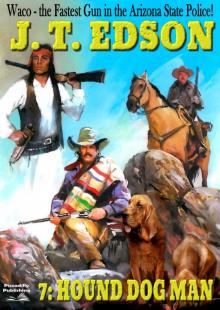 Waco 7
Waco 7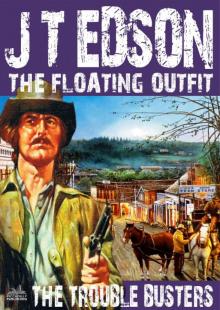 The Floating Outfit 25
The Floating Outfit 25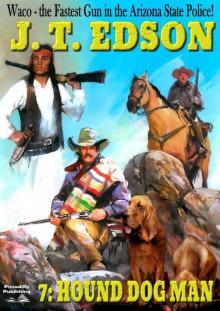 Waco 7: Hound Dog Man (A Waco Western)
Waco 7: Hound Dog Man (A Waco Western)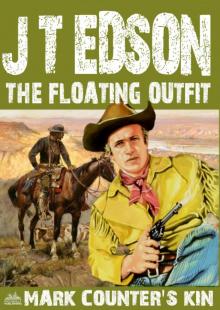 The Floating Outfit 47
The Floating Outfit 47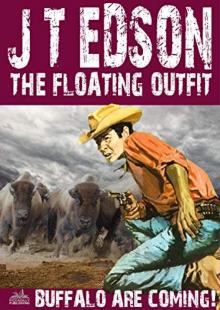 The Floating Outfit 42: Buffalo Are Coming!
The Floating Outfit 42: Buffalo Are Coming!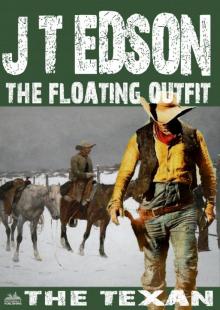 The Floating Outfit 46
The Floating Outfit 46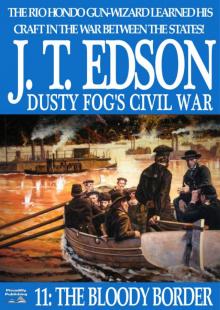 Dusty Fog's Civil War 11
Dusty Fog's Civil War 11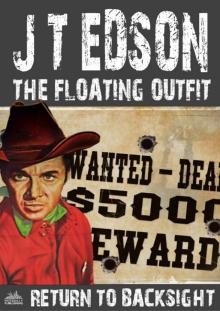 The Floating Outfit 61
The Floating Outfit 61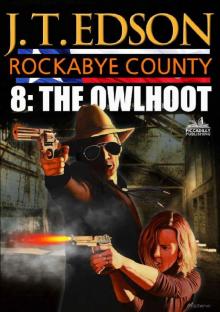 The Owlhoot
The Owlhoot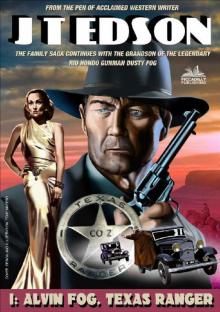 Alvin Fog, Texas Ranger
Alvin Fog, Texas Ranger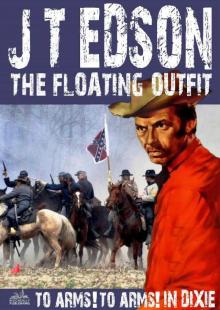 The Floating Outfit 34: To Arms! To Arms! In Dixie! (A Floating Outfit Western)
The Floating Outfit 34: To Arms! To Arms! In Dixie! (A Floating Outfit Western)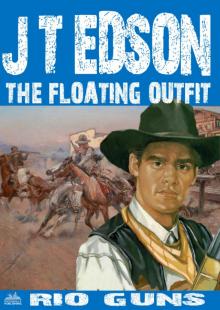 The Floating Outfit 44
The Floating Outfit 44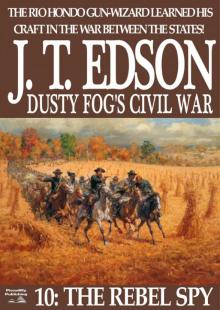 Dusty Fog's Civil War 10
Dusty Fog's Civil War 10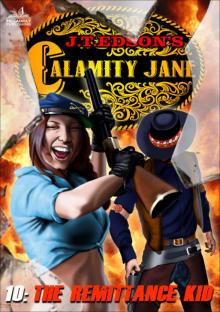 Calamity Jane 10
Calamity Jane 10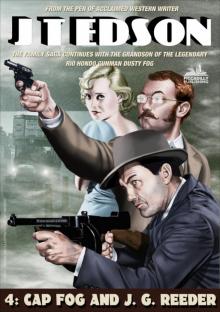 Cap Fog 4
Cap Fog 4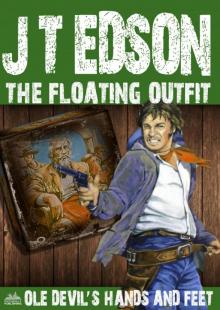 The Floating Outfit 51
The Floating Outfit 51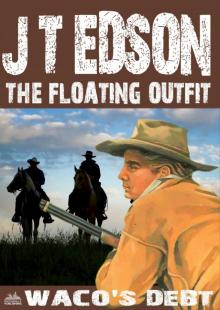 The Floating Outfit 50
The Floating Outfit 50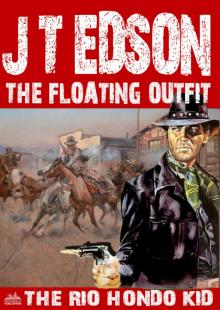 The Floating Outfit 49
The Floating Outfit 49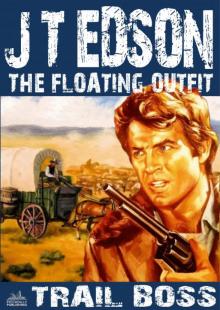 The Floating Outfit 10
The Floating Outfit 10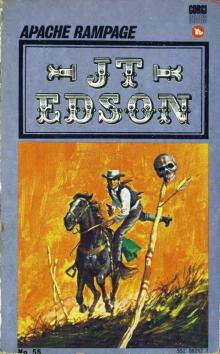 Apache Rampage
Apache Rampage The Floating Outfit 15
The Floating Outfit 15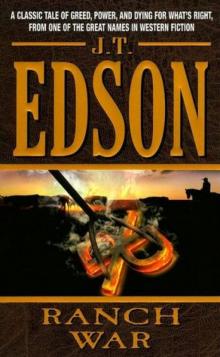 Ranch War
Ranch War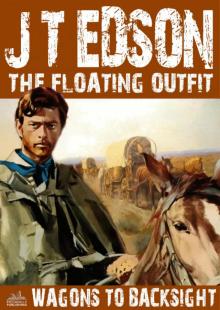 The Floating Outfit 11
The Floating Outfit 11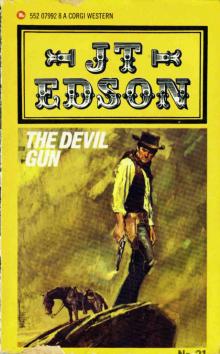 The Devil Gun
The Devil Gun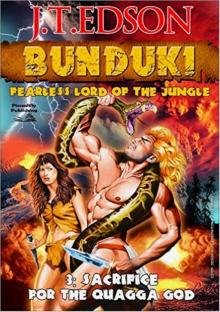 Sacrifice for the Quagga God (A Bunduki Jungle Adventure Book 3)
Sacrifice for the Quagga God (A Bunduki Jungle Adventure Book 3)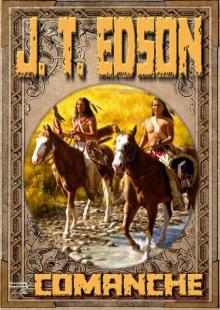 Comanche (A J.T. Edson Western Book 1)
Comanche (A J.T. Edson Western Book 1)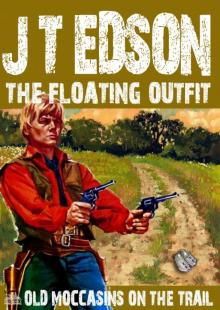 The Floating Outfit 48
The Floating Outfit 48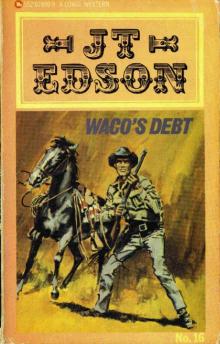 Wacos Debt
Wacos Debt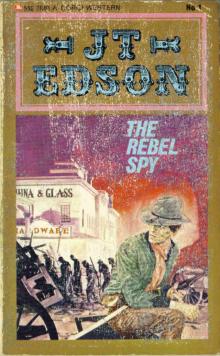 The Rebel Spy
The Rebel Spy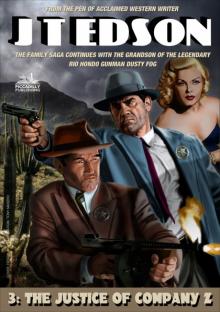 Cap Fog 3
Cap Fog 3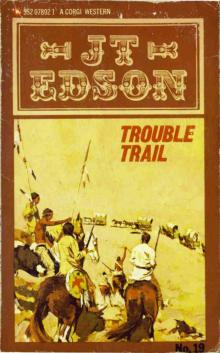 Trouble Trail
Trouble Trail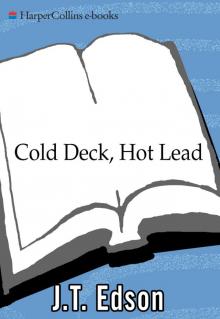 Cold Deck, Hot Lead
Cold Deck, Hot Lead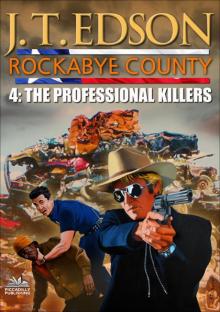 Rockabye County 4
Rockabye County 4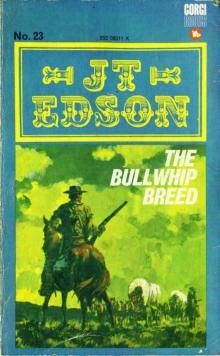 The Bullwhip Breed
The Bullwhip Breed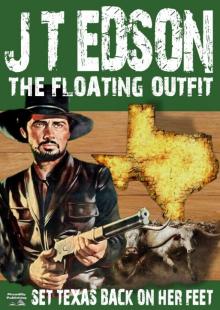 Set Texas Back On Her Feet (A Floating Outfit Western Book 6)
Set Texas Back On Her Feet (A Floating Outfit Western Book 6)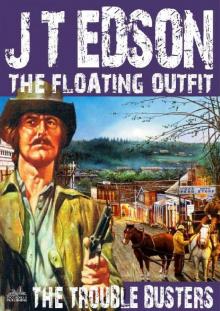 The Floating Outfit 25: The Trouble Busters (A Floating Outfit Western)
The Floating Outfit 25: The Trouble Busters (A Floating Outfit Western)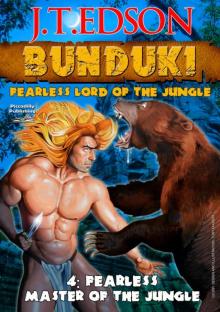 Fearless Master of the Jungle (A Bunduki Jungle Adventure
Fearless Master of the Jungle (A Bunduki Jungle Adventure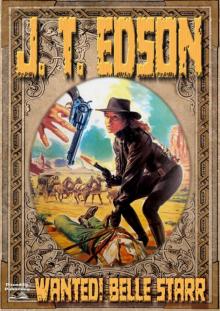 Wanted! Belle Starr!
Wanted! Belle Starr!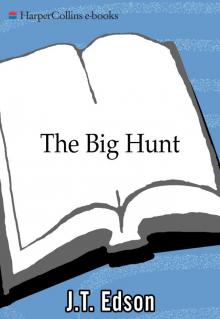 The Big Hunt
The Big Hunt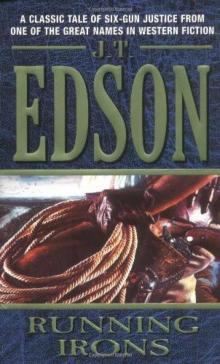 Running Irons
Running Irons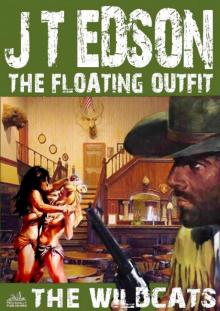 The Floating Outfit 19
The Floating Outfit 19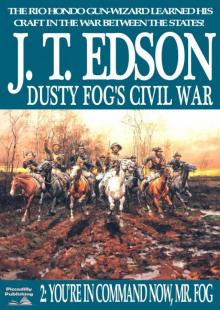 You're in Command Now, Mr Fog
You're in Command Now, Mr Fog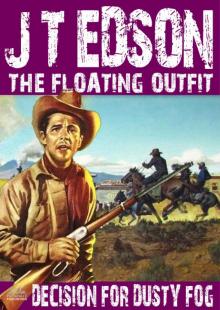 The Floating Outfit 27
The Floating Outfit 27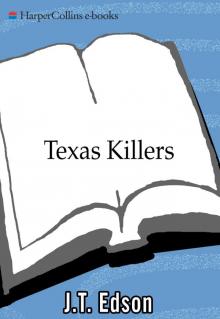 Texas Killers
Texas Killers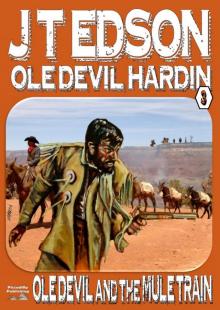 Ole Devil and the Mule Train (An Ole Devil Western Book 3)
Ole Devil and the Mule Train (An Ole Devil Western Book 3)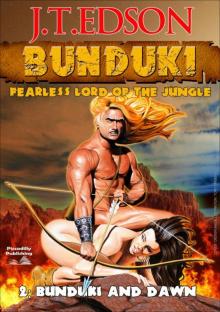 Bunduki and Dawn (A Bunduki Jungle Adventure Book 2)
Bunduki and Dawn (A Bunduki Jungle Adventure Book 2)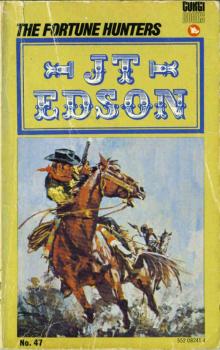 The Fortune Hunters
The Fortune Hunters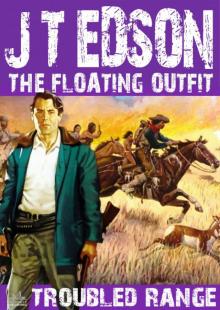 The Floating Outfit 12
The Floating Outfit 12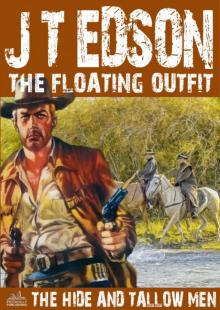 The Hide and Tallow Men (A Floating Outfit Western. Book 7)
The Hide and Tallow Men (A Floating Outfit Western. Book 7)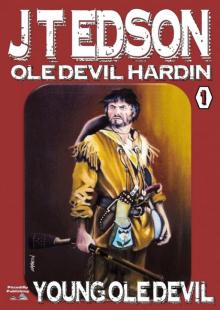 Young Ole Devil
Young Ole Devil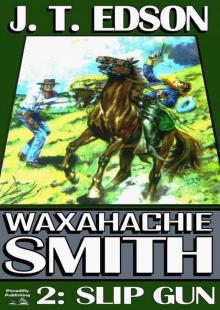 Slip Gun
Slip Gun The Drifter
The Drifter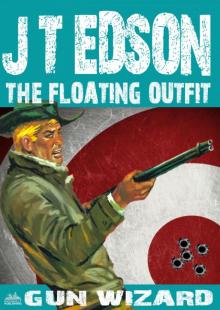 The Floating Outfit 45
The Floating Outfit 45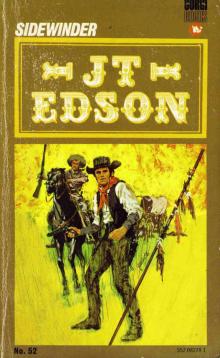 Sidewinder
Sidewinder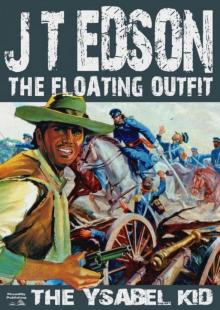 The Ysabel Kid
The Ysabel Kid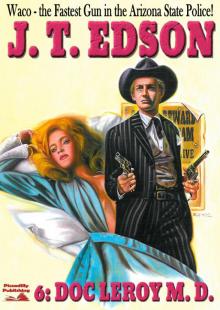 Waco 6
Waco 6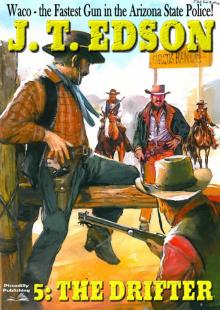 Waco 5
Waco 5 Point of Contact
Point of Contact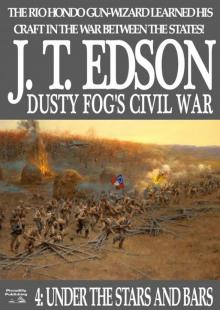 Under the Stars and Bars (A Dusty Fog Civil War Western Book 4)
Under the Stars and Bars (A Dusty Fog Civil War Western Book 4)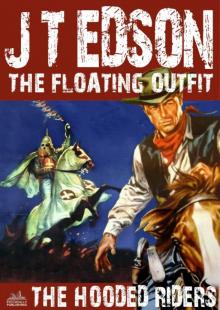 The Floating Outfit 9
The Floating Outfit 9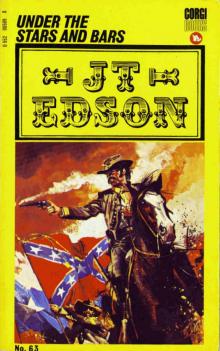 Under the Stars and Bars
Under the Stars and Bars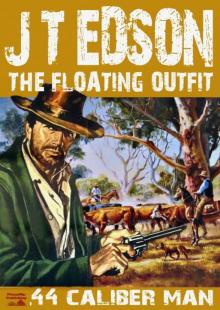 .44 Caliber Man
.44 Caliber Man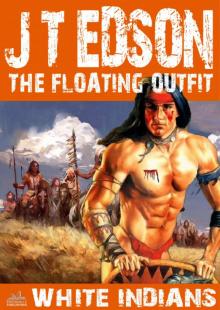 The Floating Outfit 17
The Floating Outfit 17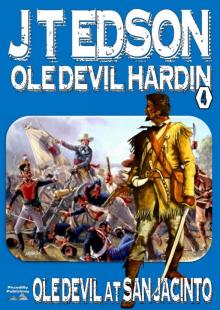 Ole Devil at San Jacinto (Old Devil Hardin Western Book 4)
Ole Devil at San Jacinto (Old Devil Hardin Western Book 4)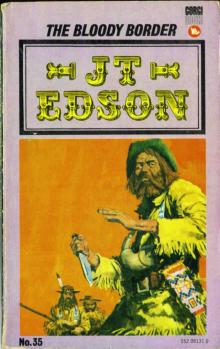 The Bloody Border
The Bloody Border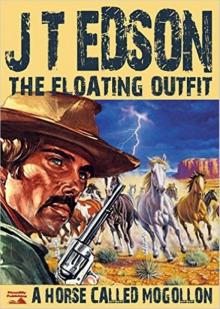 A Horse Called Mogollon (Floating Outfit Book 3)
A Horse Called Mogollon (Floating Outfit Book 3)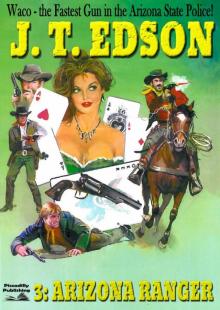 Waco 3
Waco 3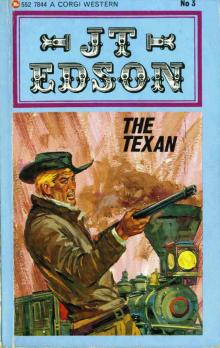 The Texan
The Texan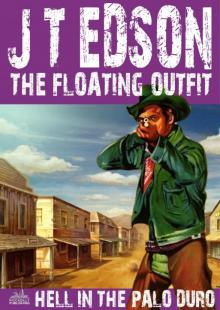 The Floating Outfit 35
The Floating Outfit 35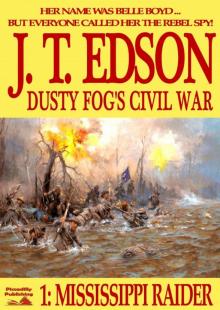 Mississippi Raider
Mississippi Raider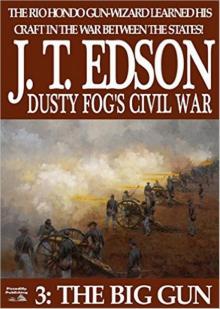 The Big Gun (Dusty Fog's Civil War Book 3)
The Big Gun (Dusty Fog's Civil War Book 3)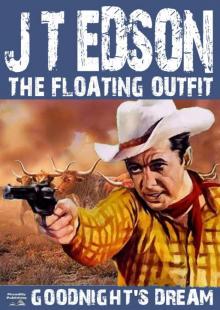 Goodnight's Dream (A Floating Outfit Western Book 4)
Goodnight's Dream (A Floating Outfit Western Book 4) Waco 4
Waco 4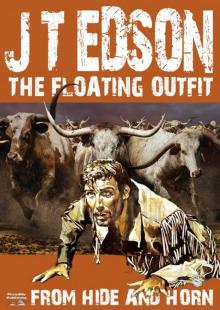 From Hide and Horn (A Floating Outfit Book Number 5)
From Hide and Horn (A Floating Outfit Book Number 5)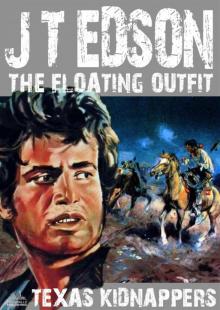 The Floating Outfit 18
The Floating Outfit 18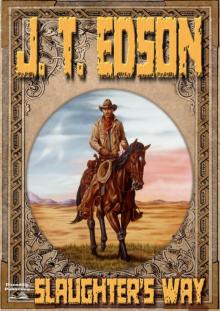 Slaughter's Way (A J.T. Edson Western)
Slaughter's Way (A J.T. Edson Western)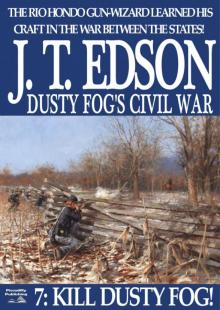 Dusty Fog's Civil War 7
Dusty Fog's Civil War 7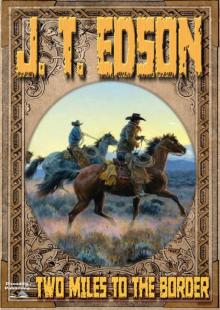 Two Miles to the Border (A J.T. Edson Western)
Two Miles to the Border (A J.T. Edson Western)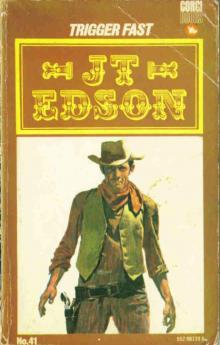 Trigger Fast
Trigger Fast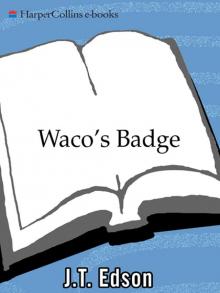 Waco's Badge
Waco's Badge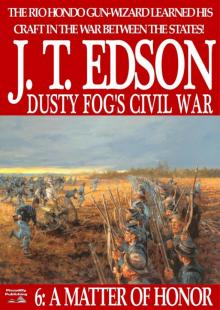 A Matter of Honor (Dusty Fog Civil War Book 6)
A Matter of Honor (Dusty Fog Civil War Book 6)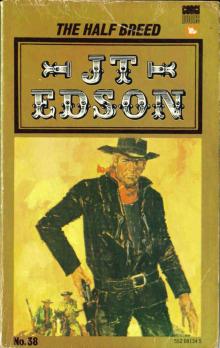 The Half Breed
The Half Breed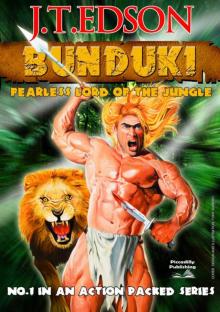 Bunduki (Bunduki Series Book One)
Bunduki (Bunduki Series Book One)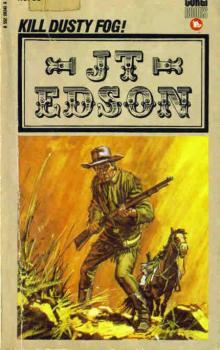 Kill Dusty Fog
Kill Dusty Fog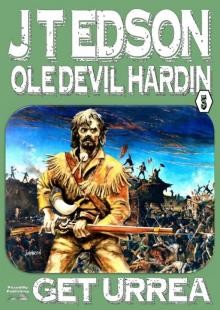 Get Urrea! (An Ole Devil Hardin Western Book 5)
Get Urrea! (An Ole Devil Hardin Western Book 5)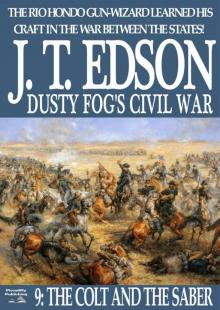 Dusty Fog's Civil War 9
Dusty Fog's Civil War 9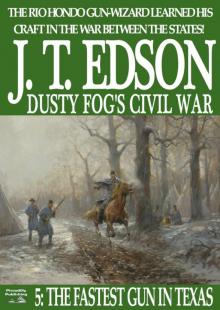 The Fastest Gun in Texas (A Dusty Fog Civil War Book 5)
The Fastest Gun in Texas (A Dusty Fog Civil War Book 5)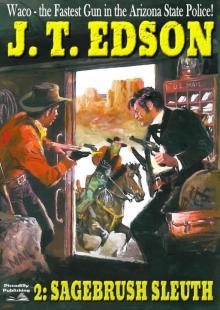 Sagebrush Sleuth (A Waco Western #2)
Sagebrush Sleuth (A Waco Western #2)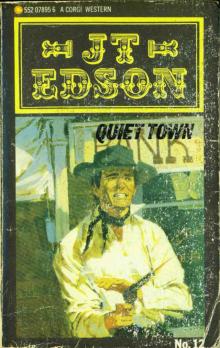 Quiet Town
Quiet Town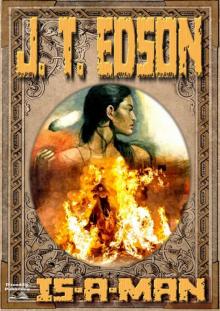 Is-A-Man (A J.T. Edson Standalone Western)
Is-A-Man (A J.T. Edson Standalone Western)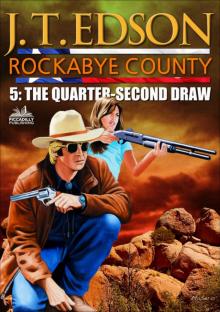 Rockabye County 5
Rockabye County 5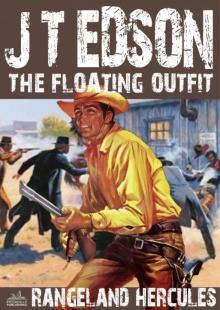 The Floating Outfit 14
The Floating Outfit 14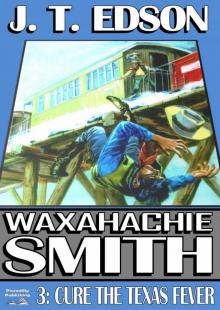 Cure the Texas Fever (A Waxahachie Smith Western--Book 3)
Cure the Texas Fever (A Waxahachie Smith Western--Book 3)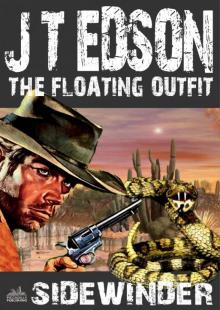 The Floating Outfit 13
The Floating Outfit 13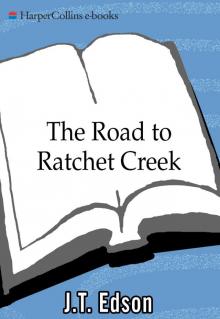 The Road to Ratchet Creek
The Road to Ratchet Creek